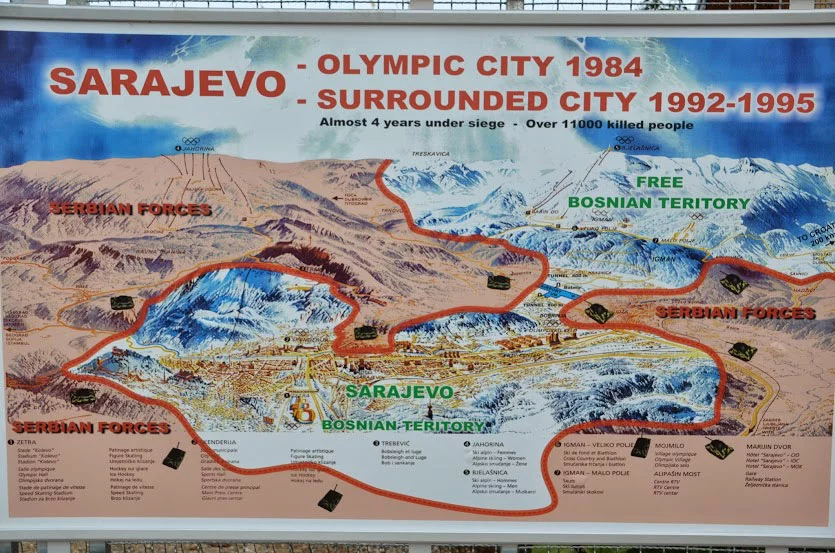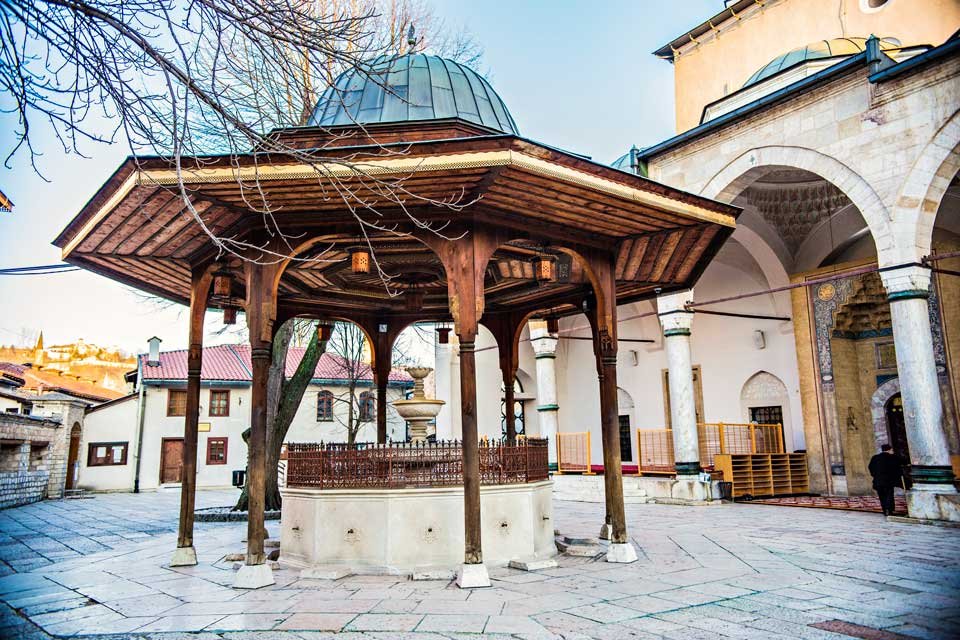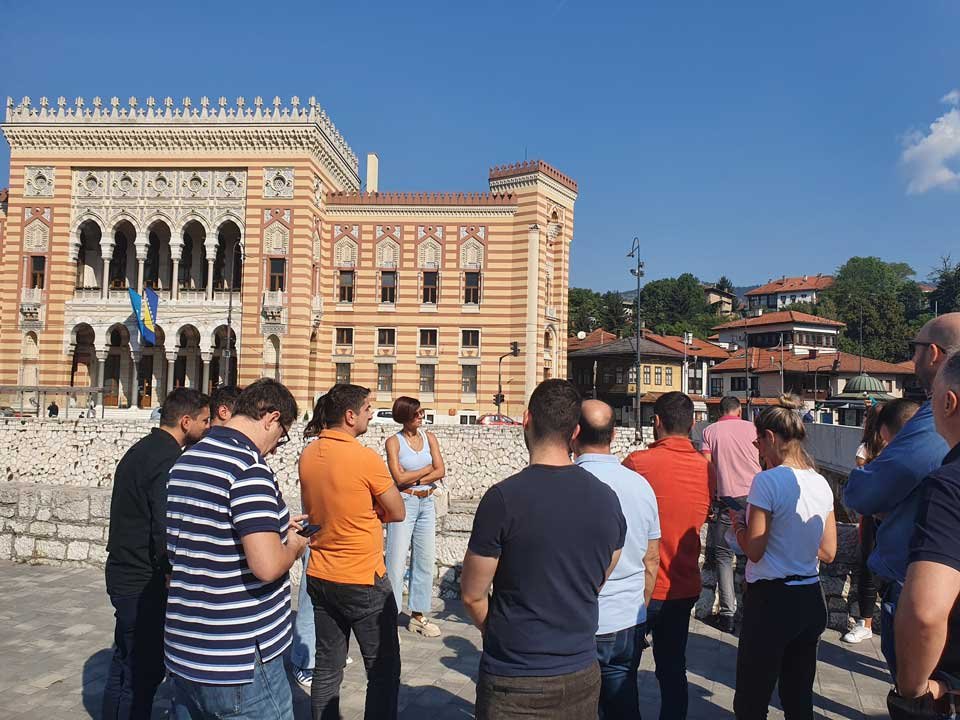8 hours
Daily Tour
Unlimited
English
For travelers with limited time or those eager to make the most of their stay, our “One Day in Sarajevo” tour is tailor-made to maximize the experience. Further immersing yourself in the city’s rich history, covering its origin, Ottoman and Austro-Hungarian periods, Assassination of Franz Ferdinand, Yugoslav era, and the impactful War in Bosnia and Herzegovina.
We have covered everything! Your day is filled with exploration! From the charming Bascarsija and the grandeur of the Austro-Hungarian Old Town. Next the famous Tunnel of Hope and the graffiti covered Bobsleigh track. Second largest Jewish cemetery and Yellow fortress. On top of that you will have traditional Bosnian lunch “Sahan”. Five different meals in one plate with vegetarian friendly option. Finally, cherry on the top is Bosnian coffee drinking experience.
This tour seamlessly blends three different tours, offering a more comprehensive experience than individually booked.

It takes about 30 minutes to drive to the Tunnel of Hope. During the drive, the tour guide will describe various areas of the city, highlighting locations and structures significant to the storyline. You will be able to identify the demolished structures from the video presentation at the Tunnel of Hope Museum. Panoramic tour includes passing by:

During the Siege of Sarajevo, one of the longest and deadliest in modern history, a lifeline emerged beneath the city streets, known today as the Tunnel of Hope. This secret tunnel underneath UN controlled airport was just 1 meter wide and 1.6 meters high. It stretched for nearly 800 meters, connecting the besieged city to the outside world. Constructed in 1993 by Bosnian soldiers and volunteers, this engineering marvel allowed food, supplies, and in average 4000 people every day to pass beneath the airport runway. The Tunnel of Hope Museum, established in 1996, now preserves this remarkable piece of history, displaying photographs, artifacts, and the original tunnel entrance, offering visitors a profound insight into the courage and resilience of Sarajevo's people during those challenging times. If not for Tunnel, Bosnia and Herzegovina would not exist today.

Hidden in the Trebevic mountain lies a unique relic of the 1984 Winter Olympics: the abandoned bobsleigh track. This concrete marvel, originally designed for Olympic athletes to hurtle down icy slopes, has taken on a new life as a canvas for urban art and a symbol of Sarajevo's resilience. Constructed in the Trebević Mountains, the track was part of the city's vibrant sporting history. However, during the brutal Siege of Sarajevo in the 1990s, it fell into disrepair, enduring artillery fire and neglect. Today, graffiti artists from around the world have transformed it into a mesmerizing open-air art gallery. With our guide hike up to the track and explore its colorful curves. NOTE: Remember to bring camera!

Hotel Osmice was constructed high above Sarajevo on the slopes of Trebevic Mountain, and now it lies in ruins. What was once a popular hangout for locals is now a somber reminder of the city's destruction in the 1990s. The enemy forces used it as a vantage point to overlook the city of Sarajevo as they bombarded it with artillery. An easy to miss location recently has been popularized by our agency.

Established in the late 17th century, the Jewish Cemetery is one of the oldest Jewish burial sites in Europe. It served as the final resting place for generations of Jewish families who called Sarajevo home. UNESCO-protected Bosnian tombstones known as "Stećak" served as inspiration for majority of grave markers. Tombstones engraved with Hebrew and Ladino, provide a glimpse into the rich cultural heritage of the Jewish community in Sarajevo. Unfortunately during the recent war it was used as sniper nest.

Once a strategic defense point overlooking Sarajevo, the Yellow Fortress has transformed into an emblematic spot for both locals and tourists. Its curious name comes from the color of its stone, which seems to radiate golden hues during the setting sun. Short walk to the top is rewarded with panoramic views of Sarajevo's red-roofed old town, the Miljacka River, and the surrounding mountains. The Soldiers Cemetery, located beneath the forth, is the resting place of Alija Izetbegovic, the first president of Bosnia and Herzegovina. His last wish was to be surrounded by fellow soldiers.

Sahan, meaning 'plate,' is a delightful Bosnian culinary experience. In Ascinica, a traditional Bosnian restaurant, ordering Sahan treats you to up to 5 delectable dishes like sarma, dolma, sitni cevap, filled paprika, and zucchini—all bursting with delicious flavors. Don't worry; you can also customize your meal by choosing your preferred dishes

Step into Sarajevo's enchanting Ottoman past, where stories of centuries gone by echo through its cobblestone streets and ornate architecture. Join us on a journey back in time to discover the rich history and culture that shaped this Balkan gem. Listen to the coppersmith's hammer, taste traditional delights, sip from ancient fountains, and uncover the city's famous legends. Learn about Islam and its profound impact on the people of Sarajevo, as you uncover the cultural and historical diversity of the city. Old Town (Baščaršija) walking tours includes visit to:

During the Austro-Hungarian era in Sarajevo, which began in the late 19th century, the city underwent a significant transformation. This period saw the construction of European-style buildings and a focus on historicist architecture, leaving a lasting impact on Sarajevo's look and feel. This era brought modernization, including the introduction of trams and improved utilities. Sarajevo became a cultural melting pot, welcoming artists, intellectuals, and entrepreneurs from various backgrounds. Today, the city proudly displays its Austro-Hungarian heritage through its architecture and urban planning. In Sarajevo Center you will see:
Tried it and recommend it! Simple to use. https://www.youtube.com/watch?v=_ScOSZQzRvc